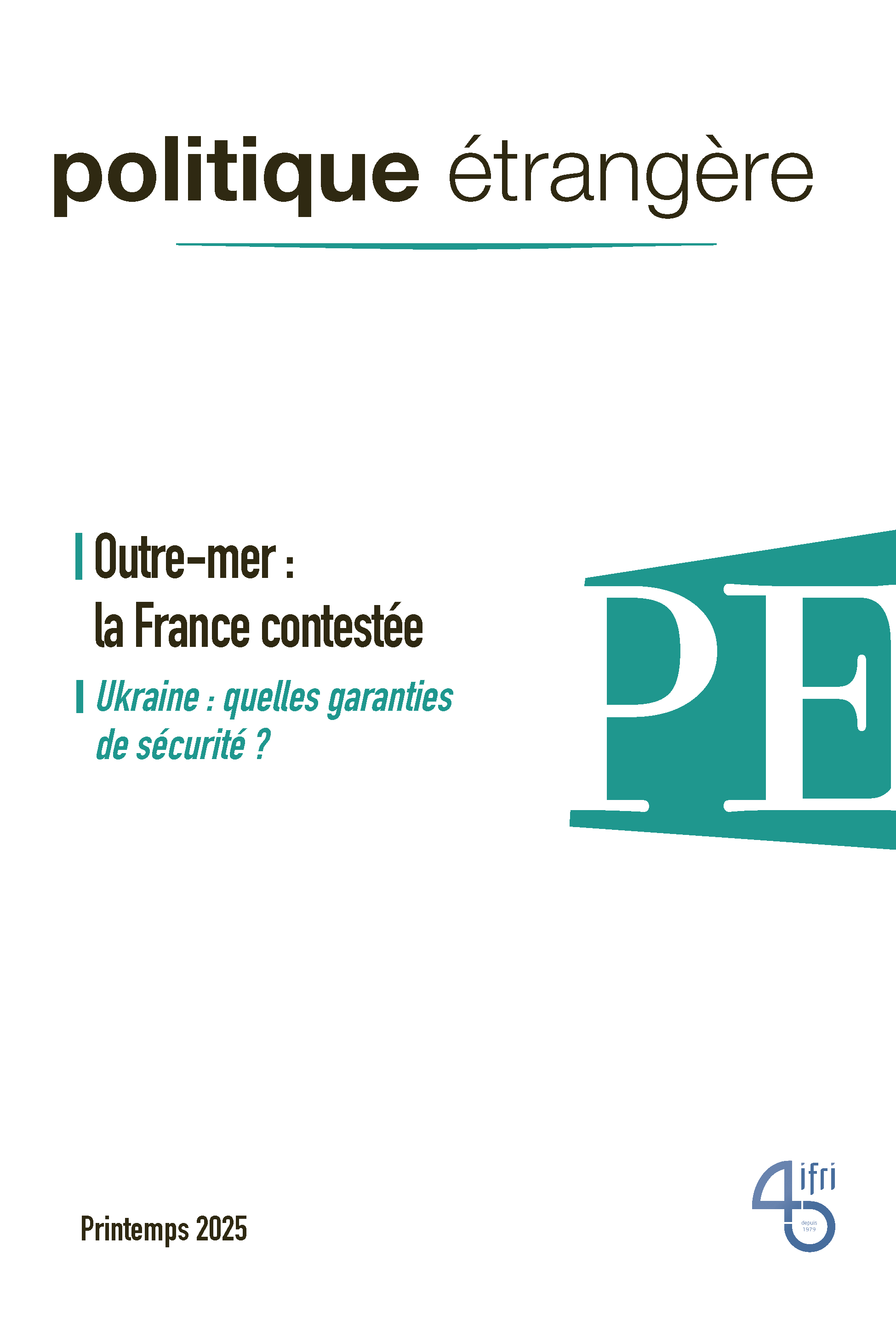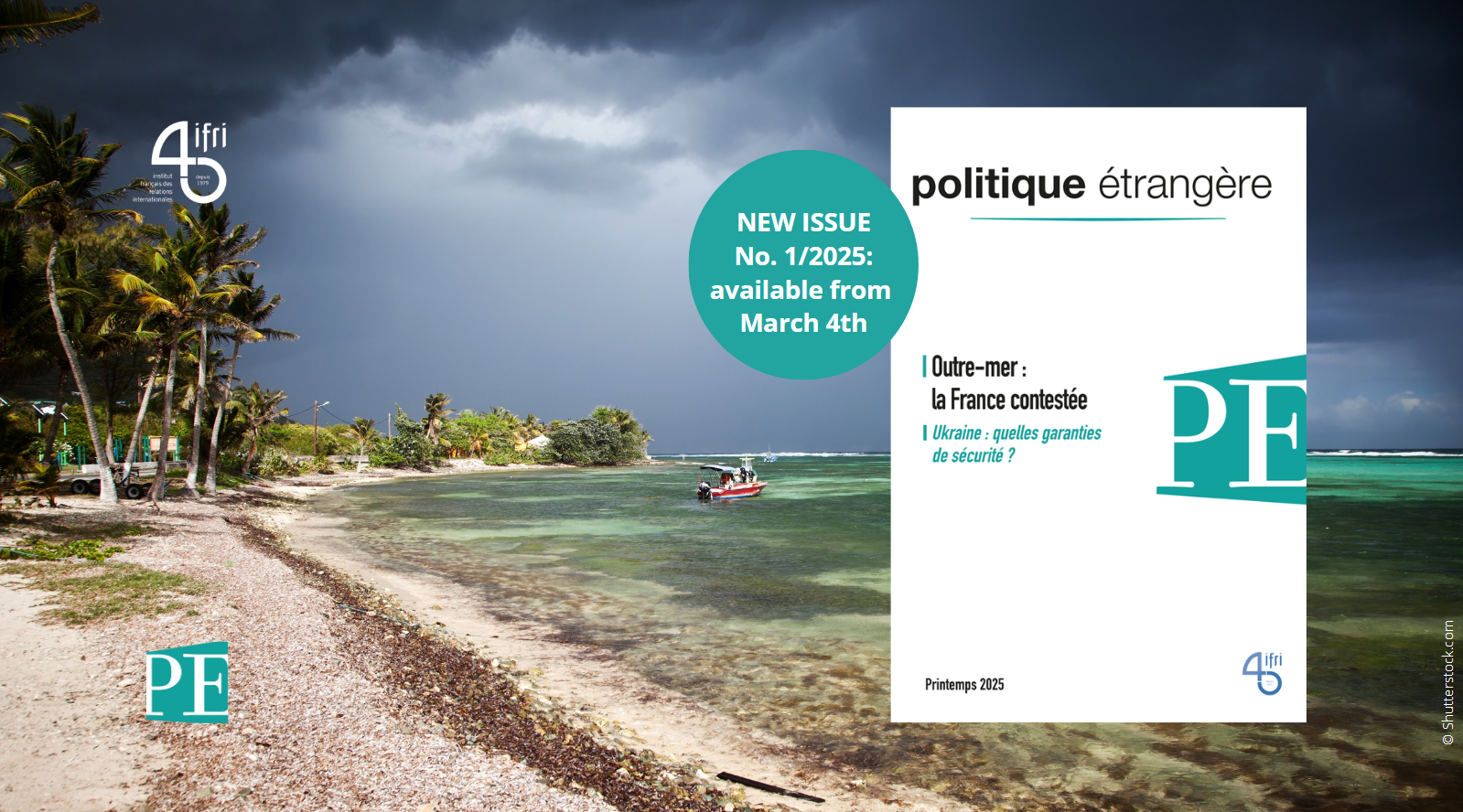France Contested in Overseas Territories - Politique étrangère, Vol. 90, No. 1, Spring 2025

New Caledonia, Mayotte: France's overseas territories were severely shaken in 2024. Beyond explanations of the economic situation, the place of these overseas territories in French policies and strategies is once again being called into question.
Are France's overseas territories the remnants of an outdated colonialism? Or, on the contrary, are they supports for an extended French presence that the opening-up of the world makes indispensable, and barriers raised here and there against the appetites of new powers? In any case, what policies should the Hexagone pursue in these regions, to promote better development and more effective integration into their environment? And is the legal status of these overseas territories untouchable?

Three years after the Russian invasion of Ukraine, is it time for negotiation and diplomacy? The opening of negotiations to end the conflict would presuppose that each of the direct protagonists believes it is in their interest to do so; that we know what we intend to negotiate–a simple suspension of operations or the conditions for a more lasting peace; and that we can agree on security guarantees for Ukraine in both hypotheses: a provisional ceasefire or the organization of peace. These security guarantees are extremely complex to define, as we have known for some time. In any event, the European Union, which is largely absent from the debate today, would be well advised to bring its weight to bear, which it cannot do without a common strategy and common resources.
This issue is available in French only: Outre-mer : la France contestée
FRANCE CONTESTED IN ITS OVERSEAS TERRITORIES
Overseas Territories in French Foreign Policy, by Frédéric Charillon and Fred Constant
French Overseas Territories: The Other Illusion of Power, by Richard Werly
The Caribbean: Geopolitical Interfaces?, by Laurent Giacobbi
La Réunion and Mayotte, France's Last Cards in Africa, by Christophe Rocheland
Oceania: An Underestimated Emancipation of French Collectivities, by Jean-Marc Regnault
New Caledonia, between Crises and Indo-Pacific Strategies, by Frédéric Angleviel
UKRAINE: WHAT SECURITY GUARANTEES?
Ukraine: A Year of Uncertain Peace, by Pierre Vimont
The Long History of Security Guarantees to Ukraine: 1991-2025, by Jean de Gliniasty
CURRENT AFFAIRS
Trump 2: Challenges for the US Military Posture, by Morgan Paglia
Afghanistan under Taliban control, by David Izadifar
Germany in Europe: Embarrassed Leadership, by Claire Demesmay
BAROMETERS
The Post-Barkhane Era in the Sahel: Jihadists on the Doorstep of Power?, by Marc-Antoine Pérouse de Montclos
Pakistan at a Crossroads, by Nathalène Reynolds
Mexico: A President in Obrador's Shadow?, by Isabelle Rousseau
BOOK REVIEWS
Under the direction of Marc Hecker
Les Nouvelles Règles du jeu. Comment éviter le chaos planétaire, by George Papaconstantinou and Jean Pisani-Ferry
La Grande Rupture. 1989-2024. De la chute du mur à la guerre d'Ukraine, by Georges-Henri Soutou
From Thomas Gomart
Israël, l’impossible État normal, by Denis Charbit
The Killing of Gaza: Reports on a Catastrophe, by Gideon Levy
Une étrange défaite. Sur le consentement à l'écrasement de Gaza, by Didier Fassin
Israël-Palestine, année zéro. Le 7 octobre 2023, une onde de choc mondiale, by David Khalfa (ed.)
From Amélie Férey
240 pages. 23 euros.
March 4th, 2025.
Diffusion : Pollen/Dif'Pop.
Subscription: Armand Colin.
To buy an issue: leslibraires.fr.
To buy the Epub (in French): Immatériel.fr.
Have a look on Politique étrangère's blog: Politique étrangère.
Find out more
Discover all our analysesForeword
In this special issue of Foreign Policy devoted to the proceedings of the conference organized by Ifri on April 10, 2019, in the Grand Amphitheater of the Sorbonne, on the occasion of its fortieth anniversary, read the foreword by Thierry de Montbrial, founder and president of Ifri.
Conclusions
In this special issue of Politique étrangère devoted to the proceedings of the conference organized by Ifri on April 10, 2019, at the Grand Amphitheater of the Sorbonne, on the occasion of its 40th anniversary, read the speech by Jean-Yves Le Drian, French Minister of Europe and Foreign Affairs.
New Global Challenges and European Security
In this special issue of Politique étrangère devoted to the proceedings of the conference organized by Ifri on April 10, 2019, in the Grand Amphitheater of the Sorbonne, on the occasion of its fortieth anniversary, discover the debate moderated by Nicole Gnesotto between Julian King, Jean-Marie Guéhenno, Wolfgang Ischinger, Nathalie Tocci, Hubert Védrine.
Industry Response to New Protectionism
In this special issue of Politique étrangère devoted to the proceedings of the conference organized by Ifri on April 10, 2019, in the Grand Amphitheater of the Sorbonne, on the occasion of its fortieth anniversary, discover the debate moderated by Thierry de Montbrial between Jean-Paul Agon and Patrick Pouyané.








